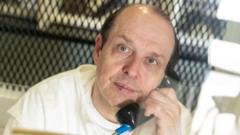In a remarkable turn of events, a Texas judge has intervened to block the execution of Robert Roberson, who was facing capital punishment for the death of his two-year-old daughter, Nikki Curtis, under highly contentious circumstances. Scheduled for execution just two hours from now, the judge issued a temporary restraining order, allowing Roberson the opportunity to testify in a legislative hearing next week.
Roberson, who has been on death row since 2003, has consistently maintained his innocence, arguing that Nikki's death resulted from pneumonia complications rather than abuse. This narrative has been contrasted sharply by prosecutors, who argue that newly surfaced evidence does not sufficiently overturn the basis for his original conviction, which involved a post-mortem examination concluding that blunt-force trauma was the cause of death.
On the cusp of execution, a bipartisan group comprising 86 Texas lawmakers, medical experts, and advocates—including notable figures like author John Grisham—voiced their support for clemency. Their arguments centered on the flawed understanding of "shaken baby syndrome" at the time of Roberson’s conviction. Grisham stated, “In Robert’s case there was no crime and yet we’re about to kill somebody for it in Texas,” highlighting the growing skepticism around the scientific basis for such findings.
Adding to the complexity of the case, Roberson’s defense team has claimed that his undiagnosed autism influenced key perceptions around his character during the investigation. Authorities became suspicious of his demeanor post-incident, leading to implications that contributed to the charges against him.
While Texas' Board of Pardons and Paroles recently denied Roberson's clemency plea with a unanimous vote, a Travis County judge’s ruling grants a temporary reprieve. Supporters are now watching for the Texas Attorney General's appeal against the restraining order as the discussion around Roberson's fate intensifies.
As the story unfolds, it raises important questions about the legal processes, scientific evaluations in medical cases, and the implications of mental health on judicial proceedings. The upcoming legislative hearing, during which Roberson is expected to testify, could be pivotal in determining the next steps in this contentious and heart-wrenching saga.
Roberson, who has been on death row since 2003, has consistently maintained his innocence, arguing that Nikki's death resulted from pneumonia complications rather than abuse. This narrative has been contrasted sharply by prosecutors, who argue that newly surfaced evidence does not sufficiently overturn the basis for his original conviction, which involved a post-mortem examination concluding that blunt-force trauma was the cause of death.
On the cusp of execution, a bipartisan group comprising 86 Texas lawmakers, medical experts, and advocates—including notable figures like author John Grisham—voiced their support for clemency. Their arguments centered on the flawed understanding of "shaken baby syndrome" at the time of Roberson’s conviction. Grisham stated, “In Robert’s case there was no crime and yet we’re about to kill somebody for it in Texas,” highlighting the growing skepticism around the scientific basis for such findings.
Adding to the complexity of the case, Roberson’s defense team has claimed that his undiagnosed autism influenced key perceptions around his character during the investigation. Authorities became suspicious of his demeanor post-incident, leading to implications that contributed to the charges against him.
While Texas' Board of Pardons and Paroles recently denied Roberson's clemency plea with a unanimous vote, a Travis County judge’s ruling grants a temporary reprieve. Supporters are now watching for the Texas Attorney General's appeal against the restraining order as the discussion around Roberson's fate intensifies.
As the story unfolds, it raises important questions about the legal processes, scientific evaluations in medical cases, and the implications of mental health on judicial proceedings. The upcoming legislative hearing, during which Roberson is expected to testify, could be pivotal in determining the next steps in this contentious and heart-wrenching saga.






















